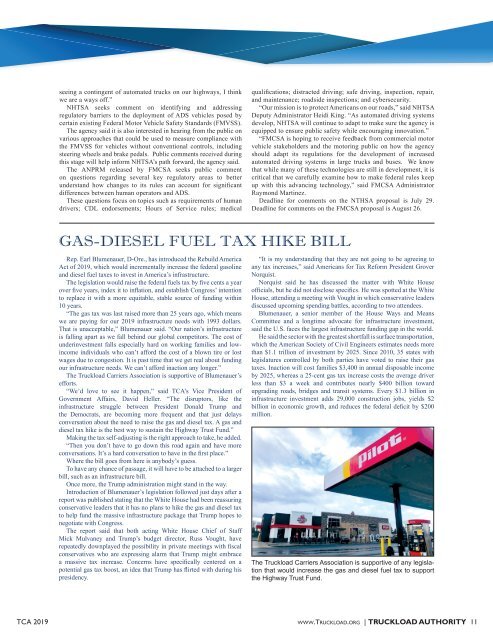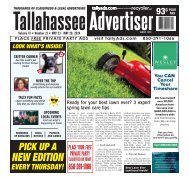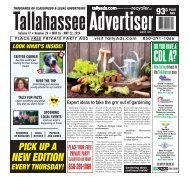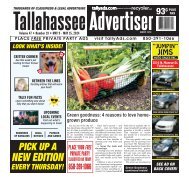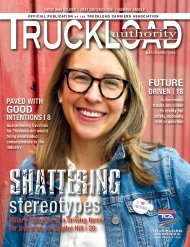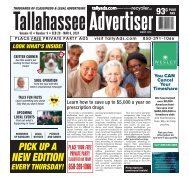TLA37_AllPages
You also want an ePaper? Increase the reach of your titles
YUMPU automatically turns print PDFs into web optimized ePapers that Google loves.
seeing a contingent of automated trucks on our highways, I think<br />
we are a ways off.”<br />
NHTSA seeks comment on identifying and addressing<br />
regulatory barriers to the deployment of ADS vehicles posed by<br />
certain existing Federal Motor Vehicle Safety Standards (FMVSS).<br />
The agency said it is also interested in hearing from the public on<br />
various approaches that could be used to measure compliance with<br />
the FMVSS for vehicles without conventional controls, including<br />
steering wheels and brake pedals. Public comments received during<br />
this stage will help inform NHTSA’s path forward, the agency said.<br />
The ANPRM released by FMCSA seeks public comment<br />
on questions regarding several key regulatory areas to better<br />
understand how changes to its rules can account for significant<br />
differences between human operators and ADS.<br />
These questions focus on topics such as requirements of human<br />
drivers; CDL endorsements; Hours of Service rules; medical<br />
qualifications; distracted driving; safe driving, inspection, repair,<br />
and maintenance; roadside inspections; and cybersecurity.<br />
“Our mission is to protect Americans on our roads,” said NHTSA<br />
Deputy Administrator Heidi King. “As automated driving systems<br />
develop, NHTSA will continue to adapt to make sure the agency is<br />
equipped to ensure public safety while encouraging innovation.”<br />
“FMCSA is hoping to receive feedback from commercial motor<br />
vehicle stakeholders and the motoring public on how the agency<br />
should adapt its regulations for the development of increased<br />
automated driving systems in large trucks and buses. We know<br />
that while many of these technologies are still in development, it is<br />
critical that we carefully examine how to make federal rules keep<br />
up with this advancing technology,” said FMCSA Administrator<br />
Raymond Martinez.<br />
Deadline for comments on the NTHSA proposal is July 29.<br />
Deadline for comments on the FMCSA proposal is August 26.<br />
GAS-DIESEL FUEL TAX HIKE BILL<br />
Rep. Earl Blumenauer, D-Ore., has introduced the Rebuild America<br />
Act of 2019, which would incrementally increase the federal gasoline<br />
and diesel fuel taxes to invest in America’s infrastructure.<br />
The legislation would raise the federal fuels tax by five cents a year<br />
over five years, index it to inflation, and establish Congress’ intention<br />
to replace it with a more equitable, stable source of funding within<br />
10 years.<br />
“The gas tax was last raised more than 25 years ago, which means<br />
we are paying for our 2019 infrastructure needs with 1993 dollars.<br />
That is unacceptable,” Blumenauer said. “Our nation’s infrastructure<br />
is falling apart as we fall behind our global competitors. The cost of<br />
underinvestment falls especially hard on working families and lowincome<br />
individuals who can’t afford the cost of a blown tire or lost<br />
wages due to congestion. It is past time that we get real about funding<br />
our infrastructure needs. We can’t afford inaction any longer.”<br />
The Truckload Carriers Association is supportive of Blumenauer’s<br />
efforts.<br />
“We’d love to see it happen,” said TCA’s Vice President of<br />
Government Affairs, David Heller. “The disruptors, like the<br />
infrastructure struggle between President Donald Trump and<br />
the Democrats, are becoming more frequent and that just delays<br />
conversation about the need to raise the gas and diesel tax. A gas and<br />
diesel tax hike is the best way to sustain the Highway Trust Fund.”<br />
Making the tax self-adjusting is the right approach to take, he added.<br />
“Then you don’t have to go down this road again and have more<br />
conversations. It’s a hard conversation to have in the first place.”<br />
Where the bill goes from here is anybody’s guess.<br />
To have any chance of passage, it will have to be attached to a larger<br />
bill, such as an infrastructure bill.<br />
Once more, the Trump administration might stand in the way.<br />
Introduction of Blumenauer’s legislation followed just days after a<br />
report was published stating that the White House had been reassuring<br />
conservative leaders that it has no plans to hike the gas and diesel tax<br />
to help fund the massive infrastructure package that Trump hopes to<br />
negotiate with Congress.<br />
The report said that both acting White House Chief of Staff<br />
Mick Mulvaney and Trump’s budget director, Russ Vought, have<br />
repeatedly downplayed the possibility in private meetings with fiscal<br />
conservatives who are expressing alarm that Trump might embrace<br />
a massive tax increase. Concerns have specifically centered on a<br />
potential gas tax boost, an idea that Trump has flirted with during his<br />
presidency.<br />
“It is my understanding that they are not going to be agreeing to<br />
any tax increases,” said Americans for Tax Reform President Grover<br />
Norquist.<br />
Norquist said he has discussed the matter with White House<br />
officials, but he did not disclose specifics. He was spotted at the White<br />
House, attending a meeting with Vought in which conservative leaders<br />
discussed upcoming spending battles, according to two attendees.<br />
Blumenauer, a senior member of the House Ways and Means<br />
Committee and a longtime advocate for infrastructure investment,<br />
said the U.S. faces the largest infrastructure funding gap in the world.<br />
He said the sector with the greatest shortfall is surface transportation,<br />
which the American Society of Civil Engineers estimates needs more<br />
than $1.1 trillion of investment by 2025. Since 2010, 35 states with<br />
legislatures controlled by both parties have voted to raise their gas<br />
taxes. Inaction will cost families $3,400 in annual disposable income<br />
by 2025, whereas a 25-cent gas tax increase costs the average driver<br />
less than $3 a week and contributes nearly $400 billion toward<br />
upgrading roads, bridges and transit systems. Every $1.3 billion in<br />
infrastructure investment adds 29,000 construction jobs, yields $2<br />
billion in economic growth, and reduces the federal deficit by $200<br />
million.<br />
The Truckload Carriers Association is supportive of any legislation<br />
that would increase the gas and diesel fuel tax to support<br />
the Highway Trust Fund.<br />
TCA 2019 www.Truckload.org | TRUCKLOAD AUTHORITY 11


